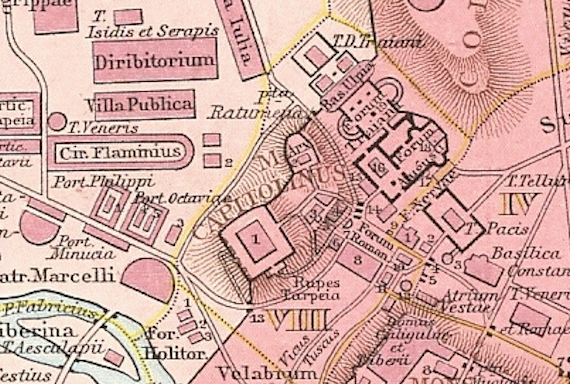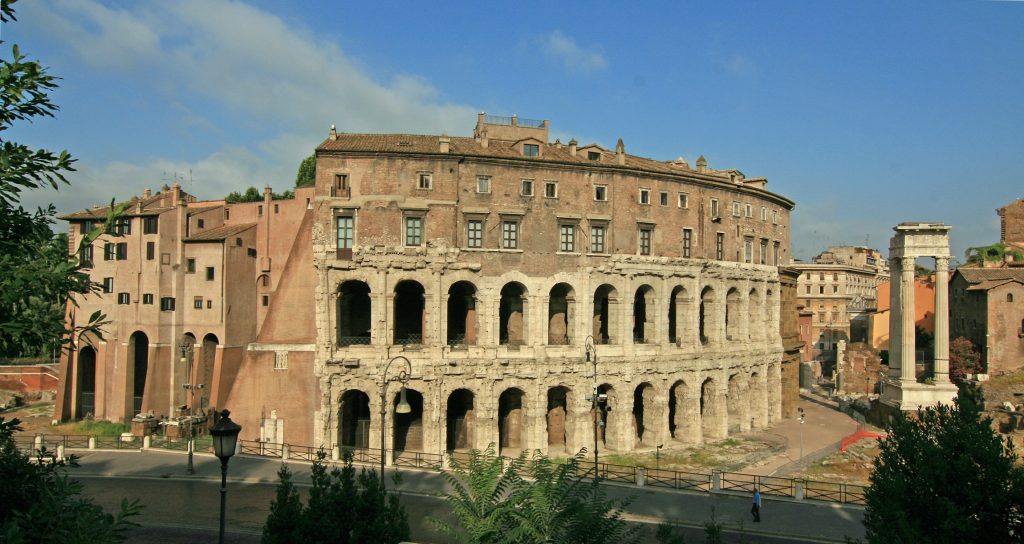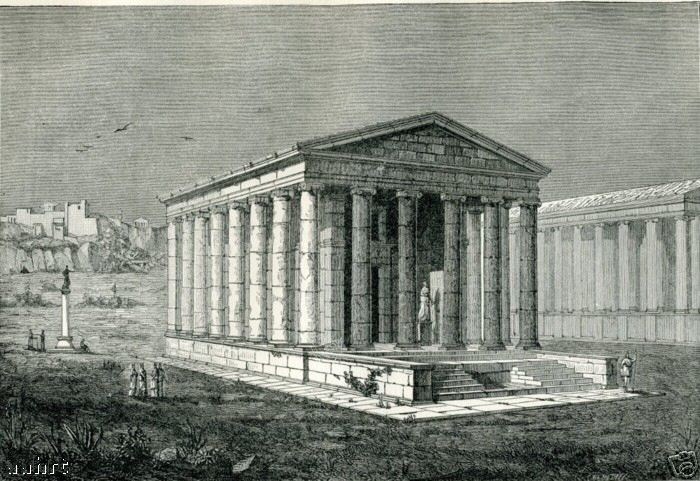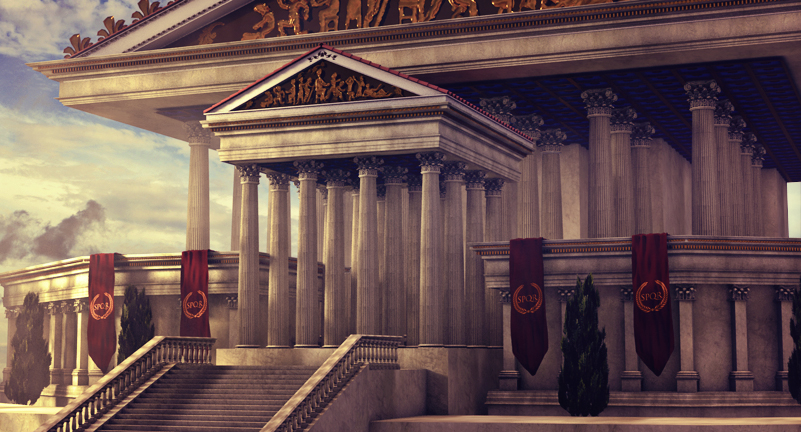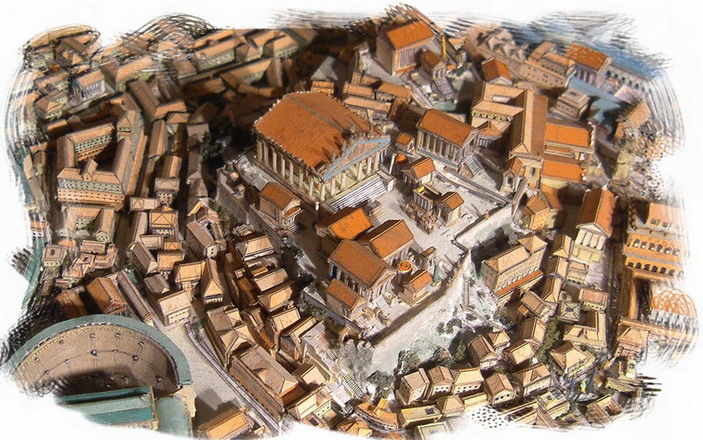By the end of this journey, you will have learned about the wedding of Perseus and Andromeda. Along the way, we’ll review the Perfect Passive System and its three tenses — the Perfect, the Pluperfect, and Future Perfect.
A. Let’s start by re-reading the last two chapters of our pulse-pounding fābula dē Perseō and adding the next installment Dē Andromedae et Perseī mātrimōniō (“The Wedding of Andromeda and Perseus”). As we continue to review, some elements of the previous versions of the story will be tweaked for elegance (and to add the new grammar that we are reviewing).
Tum rēx diem certam dīxit et omnia parāvit. Ubi ea diēs vēnit, Andromeda ad lītus dēducta est, et prō oculīs omnium ad rūpem adligāta est. Omnēs fātum ēius dēplōrābant, nec lacrimās tenēbant. At subitō, dum mōnstrum exspectant, Perseus accurrit; et ubi lacrimās vīdit, causam dolōris quaerit. Illī omnia eī expōnunt et puellam dēmōnstrant. Dum haec geruntur, clāmor terribilis audītur; simul mōnstrum horribilī formā procul cōnspicitur. Ēius forma timōrem maximum omnibus iniēcit. Mōnstrum magnā celeritāte ad lītus contendit, iamque ad locum appropinquābat ubi puella stābat.
At Perseus ubi haec vīdit, gladium suum ēdūxit, et postquam tālāria induit, in āera sublātus est. Tum dēsuper in mōnstrum impetum subitō fēcit, et gladiō suō collum ēius graviter vulnerāvit. Mōnstrum ubi sēnsit vulnus, fremitum horribilem ēdidit, et sine morā tōtum corpus in aquam mersit. Perseus dum circum lītus volat, reditum ēius exspectābat. Mare autem intereā undique sanguine īnficitur. Post breve tempus bēlua rūrsus caput sustulit; mox tamen ā Perseō plāgā graviōre vulnerāta est. Tum iterum sē in undās mersit, neque posteā vīsa est.
[incipit fābula dē Andromedae et Perseī mātrimōniō]
Perseus postquam ad lītus dēscendit, prīmum tālāria exuit; tum ad rūpem vēnit ubi Andromeda vīncta erat. Ea autem omnem spem salūtis dēposuerat, et ubi Perseus adiit, terrōre paene exanimāta erat. Ille vincula statim solvit, et puellam patrī reddidit. Cēpheus ob fīliae salūtem maximō gaudiō adfectus est. Meritam grātiam prō tantō beneficiō Perseō rettulit; praetereā Andromedam ipsam eī in mātrimōnium dedit. Ille libenter hoc dōnum accēpit et puellam dūxit. Paucōs annōs cum uxōre suā in eā regiōne habitābat, et in magnō honōre erat apud omnīs Aethiopēs. Magnopere tamen mātrem suam rūrsus vidēre cupiēbat. Tandem igitur cum uxōre suā ē rēgnō Cēpheī discessit.
B. Always read and re-read until you have a good sense of the story.
Complete this short comprehension exercise in Cerego. If you any of the aspects of the fābula eluded you, be sure to return and re-read the story and try again!
C. Now, let’s continue our tour of basic Latin morphology with this short video reviewing the Perfect Tense, Indicative Mood, Passive Voice.
D. Are you ready to tackle the Perfect Passive Indicative?
Before you practice your verb forms, take a few minutes to solidify your knowledge of the basic contours and terminology of Perfect Indicative Passive verbs with this short comprehension activity.
E. Let’s practice Perfect Indicative Passive.
1. Practice the paradigms of the Perfect Indicative Passive on Magistrula.com.
✮ Practice these paradigms on Magistrula.com, write them out again and again on a sheet of paper, muttering to yourself as you exercise, or in any way that works for you until you are completely and totally confident in your ability to reproduce the paradigm for the Perfect Indicative Passive of any (regular) verb.
If you seek more practice, you can visit linguaclassica.com.
2. Practice Identifying Perfect Indicative Passive of regular verbs on Magistrula.com until you feel very confident that you can accurately translate any basic perfect indicative passive verb that comes your way.
F. Well done! Before you climb further, take in a performance in the Theater of Marcellus.
The Theater of Marcellus was the largest and most important theater in ancient Rome. Completed in 12 BCE, as many as 20,000 spectators could watch plays and musical performances in the Theater.
G. Now, let’s move further into the past by reviewing the Pluperfect Tense, Indicative Mood, Passive Voice.
1. Invest 5 minutes reviewing the Pluperfect Indicative Passive.
2. Practice the paradigms of the Pluperfect Indicative Passive on Magistrula.com.
H. Now, let’s go back to the future by reviewing the Future Perfect Tense, Indicative Mood, Passive Voice.
1. Invest 5 minutes reviewing the Future Perfect Passive.
2. Check your knowledge of the Pluperfect and Future Perfect Passive Indicatives by completing this short comprehension exercise in Cerego.
3. Practice the paradigms of the Future Perfect Indicative Passive on Magistrula.com.
I. Practice Identifying Perfect, Pluperfect, and Future Perfect Passive verbs on Magistrula.com until you feel very confident that you can accurately translate any basic perfect passive system verb that comes your way.
J. Nicely done! Rest in the shade of the Temple of Juno Moneta. Watch out for the sacred geese!
The Temple was built on the former site of the house of Marcus Manlius Capitolinus, whose geese warned him of the approach of the Gauls during the Sack of Rome in 390 BCE. One of the earliest archives for consular records, the Temple was also the site where Romans first minted coins (and from which we derive the English word, “money”).
K. Practice of all perfect system verbs, active and passive in the story on Quizlet. You’ll be asked the tense and voice for most verbs.
L. Re-read the new chapter of our fābula with special attention to Verbs of the Perfect Passive Systems.
At Perseus ubi haec vīdit, gladium suum ēdūxit, et postquam tālāria induit, in āera sublātus est. Tum dēsuper in mōnstrum impetum subitō fēcit, et gladiō suō collum ēius graviter vulnerāvit. Mōnstrum ubi sēnsit vulnus, fremitum horribilem ēdidit, et sine morā tōtum corpus in aquam mersit. Perseus dum circum lītus volat, reditum ēius exspectābat. Mare autem intereā undique sanguine īnficitur. Post breve tempus bēlua rūrsus caput sustulit; mox tamen ā Perseō plāgā graviōre vulnerāta est. Tum iterum sē in undās mersit, neque posteā vīsa est.
Perseus postquam ad lītus dēscendit, prīmum tālāria exuit; tum ad rūpem vēnit ubi Andromeda vīncta erat. Ea autem omnem spem salūtis dēposuerat, et ubi Perseus adiit, terrōre paene exanimāta erat. Ille vincula statim solvit, et puellam patrī reddidit. Cēpheus ob fīliae salūtem maximō gaudiō adfectus est. Meritam grātiam prō tantō beneficiō Perseō rettulit; praetereā Andromedam ipsam eī in mātrimōnium dedit. Ille libenter hoc dōnum accēpit et puellam dūxit. Paucōs annōs cum uxōre suā in eā regiōne habitābat, et in magnō honōre erat apud omnīs Aethiopēs. Magnopere tamen mātrem suam rūrsus vidēre cupiēbat. Tandem igitur cum uxōre suā ē rēgnō Cēpheī discessit.
M. Nicely done! Rest and contemplate you achievements on the steps of the Temple of Jupiter Optimus Maximus.
Situated at the pinnacle of the Capitoline Hill and dedicated to Minerva, Juno, and Jupiter, this was the first monumental temple in Rome. It was here that Roman consuls took their oath of office at the beginning of their terms in office.
N. Rested, re-read our fābula with special attention to Passive Verbs of the Present and Perfect Passive Systems.
Haec nārrantur ā poētīs dē Perseō. Perseus fīlius erat Iovis, maximī deōrum; avus ēius Ācrisius appellābātur. Ācrisius volēbat Perseum nepōtem suum necāre; nam propter ōrāculum puerum timēbat. Comprehendit igitur Perseum adhūc īnfantem, et cum mātre in arcā ligneā inclūsit. Tum arcam ipsam in mare coniēcit. Danaē, Perseī māter, magnopere territa est; tempestās enim magna mare turbābat. Perseus autem in sinū mātris dormiēbat.
Iuppiter tamen haec omnia vīdit, et fīlium suum servāre cōnstituit. Tranquillum igitur fēcit mare, et arcam ad īnsulam Serīphum perdūxit. Hūius īnsulae Polydectēs tum rēx erat. Postquam arca ad lītus appulsa est, Danaē in harēnā pācem capiēbat. Post breve tempus ā piscātōre quōdam reperta est, et ad domum rēgis Polydectis adducta est. Ille mātrem et puerum benignē excēpit, et iīs sēdem tūtam in fīnibus suīs dedit. Danaē hoc dōnum libenter accēpit, et prō tantō beneficiō rēgī grātiās ēgit.
Perseus igitur multōs annōs ibi habitābat, et cum mātre suā vītam beātam agēbat. At Polydectēs Danaēn magnopere amābat, atque eam in mātrimōnium dūcere volēbat. Hoc tamen cōnsilium Perseō minimē grātum erat. Polydectēs igitur Perseum dīmittere cōnstituit. Tum iuvenem ad sē vocāvit et haec dīxit: “Turpe est hanc ignāvam vītam agere; iam dūdum tū adulēscēns es. Quō usque hīc manēbis? Tempus est arma capere et virtūtem praestāre. Hinc abī, et caput Medūsae mihi refer.”
Perseus ubi haec audīvit, ex īnsulā discessit, et postquam ad continentem vēnit, Medūsam quaesīvit. Diū frūstrā quaerēbat; namque nātūram locī ignōrābat. Tandem Apollō et Minerva viam dēmōnstrāvērunt. Prīmum ad Graeās, sorōrēs Medūsae, pervēnit. Ab hīs tālāria et galeam magicam accēpit. Apollō autem et Minerva falcem et speculum dedērunt. Tum postquam tālāria pedibus induit, in āera ascendit. Diū per āera volābat; tandem tamen ad eum locum vēnit ubi Medūsā cum cēterīs Gorgōnibus habitābat. Gorgōnēs autem mōnstra erant formā horribilī; capita enim eārum anguibus omnīnō contēcta erant. Manus etiam ex āere factae erant.
difficillimum erat caput Gorgonis abscīdere; ēius enim formā hominēs in saxum vertēbantur. Propter causam Minerva speculum Perseō dederat. Ille igitur tergum vertit, et in speculum īnspiciēbat; hōc modō ad locum vēnit ubi Medūsa dormiēbat. Tum falce suā caput ēius ūnā plāgā abscīdit. Cēterae Gorgōnēs statim ē somnō excitātae sunt, et ubi mortem vīdērunt, īrā commōtae sunt. Arma rapuērunt, et Perseum occīdere volēbant. Ille autem dum fūgit, galeam magicam induit; et ubi hoc fēcit, statim ē oculīs eārum ēvāsit.
Post haec Perseus in fīnīs Aethiopum vēnit. Ibi Cēpheus quīdam illō tempore rēgnābat. Hic Neptūnum, maris deum, ōlim offenderat; Neptūnus autem mōnstrum saevissimum mīserat. Hoc cottīdiē ē marī veniēbat et hominēs dēvorābat. Ob hanc causam pavor animōs omnium occupāverat. Cēpheus igitur ōrāculum deī Hammōnis cōnsuluit, atque ā deō iussus est fīliam mōnstrō trādere. Ēius autem fīlia, nōmine Andromeda, virgō fōrmōsissima erat. Cēpheus ubi haec audīvit, magnum dolōrem percēpit. Volēbat tamen cīvīs suōs ē tantō perīculō extrahere, atque ob eam causam imperāta Hammōnis facere cōnstituit.
Tum rēx diem certam dīxit et omnia parāvit. Ubi ea diēs vēnit, Andromeda ad lītus dēducta est, et prō oculīs omnium ad rūpem adligāta est. Omnēs fātum ēius dēplōrābant, nec lacrimās tenēbant. At subitō, dum mōnstrum exspectant, Perseus accurrit; et ubi lacrimās vīdit, causam dolōris quaerit. Illī omnia eī expōnunt et puellam dēmōnstrant. Dum haec geruntur, clāmor terribilis audītur; simul mōnstrum horribilī formā procul cōnspicitur. Ēius forma timōrem maximum omnibus iniēcit. Mōnstrum magnā celeritāte ad lītus contendit, iamque ad locum appropinquābat ubi puella stābat.
At Perseus ubi haec vīdit, gladium suum ēdūxit, et postquam tālāria induit, in āera sublātus est. Tum dēsuper in mōnstrum impetum subitō fēcit, et gladiō suō collum ēius graviter vulnerāvit. Mōnstrum ubi sēnsit vulnus, fremitum horribilem ēdidit, et sine morā tōtum corpus in aquam mersit. Perseus dum circum lītus volat, reditum ēius exspectābat. Mare autem intereā undique sanguine īnficitur. Post breve tempus bēlua rūrsus caput sustulit; mox tamen ā Perseō plāgā graviōre vulnerāta est. Tum iterum sē in undās mersit, neque posteā vīsa est.
Perseus postquam ad lītus dēscendit, prīmum tālāria exuit; tum ad rūpem vēnit ubi Andromeda vīncta erat. Ea autem omnem spem salūtis dēposuerat, et ubi Perseus adiit, terrōre paene exanimāta erat. Ille vincula statim solvit, et puellam patrī reddidit. Cēpheus ob fīliae salūtem maximō gaudiō adfectus est. Meritam grātiam prō tantō beneficiō Perseō rettulit; praetereā Andromedam ipsam eī in mātrimōnium dedit. Ille libenter hoc dōnum accēpit et puellam dūxit. Paucōs annōs cum uxōre suā in eā regiōne habitābat, et in magnō honōre erat apud omnīs Aethiopēs. Magnopere tamen mātrem suam rūrsus vidēre cupiēbat. Tandem igitur cum uxōre suā ē rēgnō Cēpheī discessit.
Z. Once you have successfully completed these activities, congratulations! You have taken the next step on your (re)exploration of Latin — and Rome — by Scaling the Capitoline Hill.
Summary of Activities on the Perfect Passive System
Cerego: [Reading Comprehension] [Perfect Passive Indicative Comprehension] [Pluperfect and Future Perfect Passive Indicative Comprehension]
Latintutorial.com: [The Perfect Passive] [The Pluperfect Passive] [The Future Perfect Passive]
Lingua classica: [Latin Verb Drill]
Magistrula: [Perfect Indicative Passive Paradigms] [Identifying Perfect Indicative Passive forms] [Pluperfect Indicative Passive Paradigms] [Future Perfect Indicative Passive Paradigms] [Identifying Perfect, Pluperfect, and Future Perfect Passive forms]
Other Resources and Practice on the Perfect Passive System
Verb conjugation practice: [Latīnē Disce] [Latināta] [Lingua Classica]
More about Latin tenses

